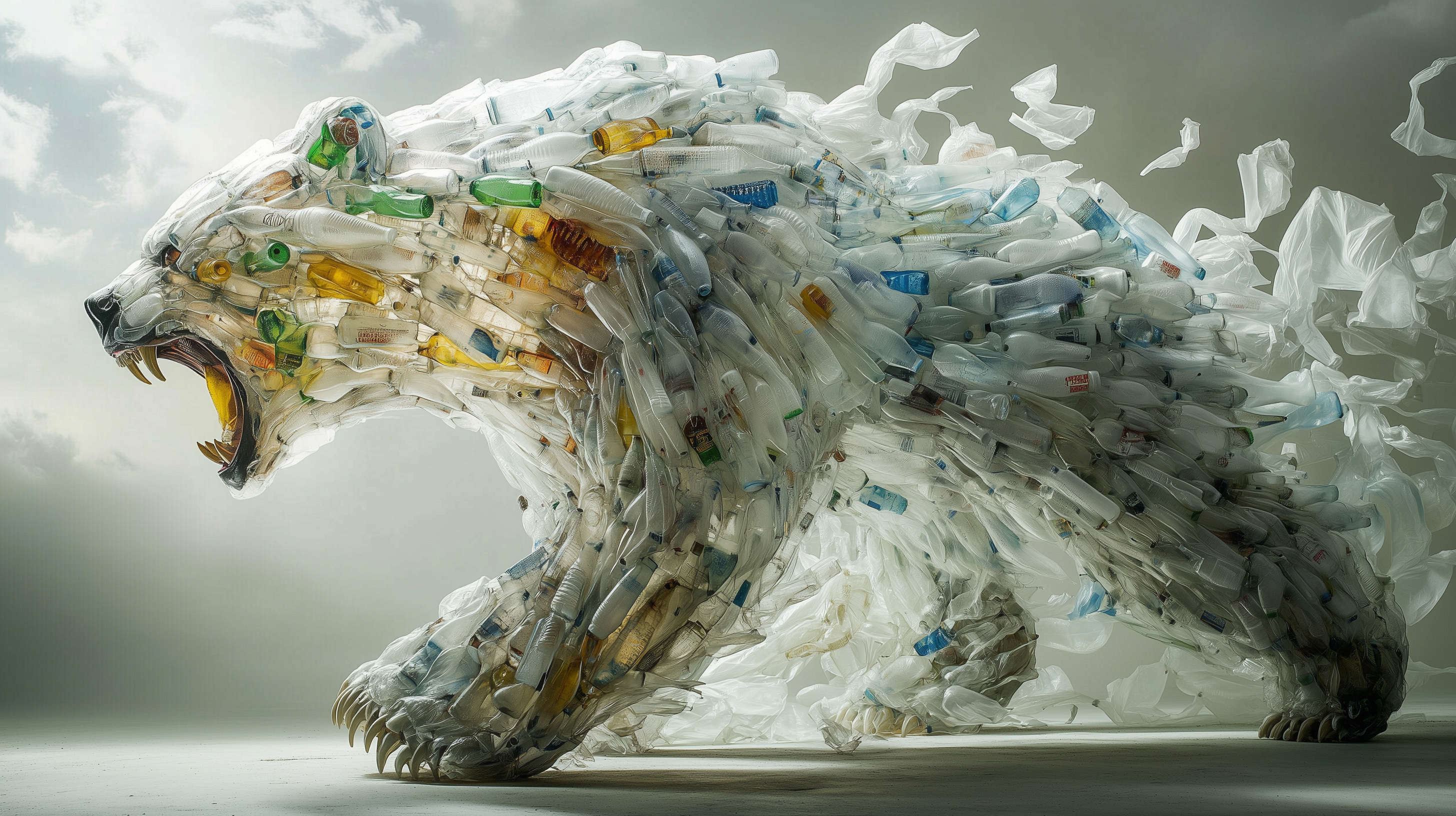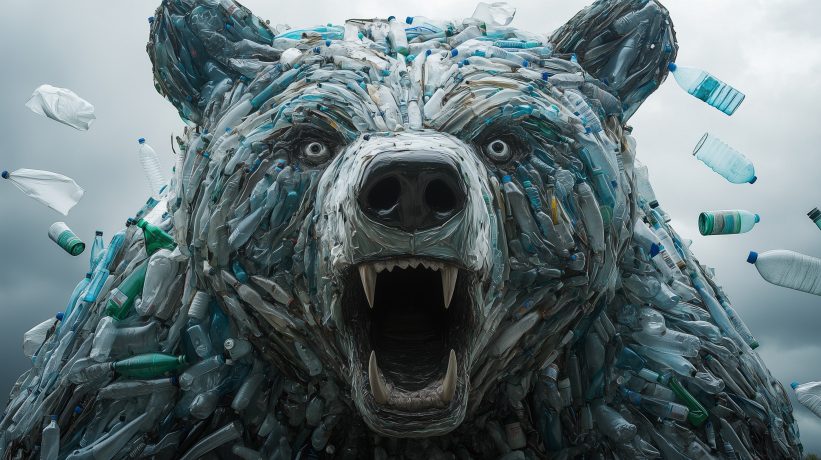
California's lawsuit against ExxonMobil exposes decades of deceptive plastic recycling claims, aiming to hold the company accountable for its role in the plastic pollution crisis. This groundbreaking case could set new precedents for corporate environmental responsibility and reshape how we address the global plastic waste problem.
by LawInc Staff
September 23, 2024
The People of the State of California have brought a groundbreaking lawsuit against oil and gas giant ExxonMobil, alleging decades of deceptive practices regarding plastic recycling. Knowing the ins and outs of this complex case is crucial for anyone concerned about corporate accountability, environmental protection, and consumer rights in the Golden State.
This overview breaks down everything you need to know about California’s case against ExxonMobil, including the allegations, causes of action, legal theories, and potential impacts. Dig in to gain a comprehensive understanding of this consequential legal battle.
From the complaint’s detailed factual background to the specific laws at issue, remedies sought, and litigation process ahead, get all your questions answered about California’s bold effort to hold ExxonMobil responsible for its role in the plastic pollution crisis.
1. Understand the Crux of the Lawsuit
-
- Allegations of Deception: The complaint alleges ExxonMobil has waged a decades-long deceptive marketing campaign.
- False Promotion of Recycling: ExxonMobil deceptively promoted mechanical and chemical recycling as viable solutions to the plastic waste crisis.
- Concealing Recycling’s Limits: Meanwhile, ExxonMobil knew recycling could never handle the massive volume of plastic waste it was generating.
- Enabling Unbridled Plastic Production: This deception allowed ExxonMobil to dramatically ramp up plastic production while avoiding responsibility for the inevitable pollution.
- Seeking Accountability for Harms: California aims to hold ExxonMobil accountable for the resulting environmental and economic harms to the State.
Key Takeaways:
-
- The core accusation is that ExxonMobil deceived the public about the viability of plastic recycling in order to continue aggressively growing its plastic production.
- The complaint details a sophisticated, multi-faceted campaign of greenwashing and misinformation by ExxonMobil spanning over 50 years.
- California argues ExxonMobil’s deceptive promotion of recycling substantially contributed to the plastic pollution crisis and its devastating impacts.
- Through this suit, the State seeks to ensure ExxonMobil pays for the damage caused by the plastic waste it deceptively enabled.
- This is a first-of-its-kind effort to tackle the root causes of plastic pollution and corporate deception in the industry.
Significance of the Case:
-
- Exposes the alleged deceptive underbelly of the plastics and recycling industry and one of its biggest players, ExxonMobil.
- Connects the dots between corporate deception, lack of recycling viability, unfettered plastic production, and the resulting pollution crisis.
- Advances a novel legal theory and strategy to tackle plastic pollution by focusing on consumer deception by plastic manufacturers.
- Puts other states and plastic producers on notice that deceptive recycling claims and rampant plastic production may create legal liability.
- Could establish important precedent and a model for other jurisdictions to hold plastic manufacturers accountable through consumer protection laws.
FAQs:
-
- Why is California targeting ExxonMobil in particular? As the largest producer of single-use plastic polymers and a vocal recycling proponent, ExxonMobil is accused of playing an outsized role in perpetuating recycling deception and plastic pollution.
- Will other plastic producers face similar lawsuits? It’s possible other states may follow California’s lead, and the CA Attorney General may also pursue actions against other major plastic manufacturers.
- What level of proof is needed for the State to prevail? California will likely need to present extensive evidence of ExxonMobil’s decades of deceptive practices and their direct connection to escalating plastic pollution and damages.
- How has ExxonMobil responded to the allegations? ExxonMobil has generally denied any wrongdoing and claims the State’s complaint misrepresents its position on plastic recycling’s effectiveness.
- What are the potential penalties if ExxonMobil loses? In addition to civil fines and damages, ExxonMobil could be ordered to fund environmental clean-up and mitigation efforts and be subject to strict injunctions on its plastic marketing claims and practices.
2. Review the Detailed Factual Allegations
-
- Promoting a “Throw-Away” Culture: In the 1950s-60s, ExxonMobil’s predecessors helped normalize single-use plastics as convenient and necessary.
- Shifting to Recycling Narrative: When plastic waste and public outcry grew in the 1970s-80s, ExxonMobil began falsely promoting recycling as the solution.
- Knowing Recycling Was Infeasible: Despite deceptive public campaigns, ExxonMobil knew recycling couldn’t handle the volume of plastic it was producing.
- Blaming Public for Recycling Failures: ExxonMobil and industry groups tried to pin low recycling rates on consumer behavior rather than technical/economic inviability.
- Continuing Deception With “Advanced Recycling”: In recent years, ExxonMobil has touted “advanced recycling” as a solution while concealing its limitations.
Key Takeaways:
-
- The complaint lays out a damning timeline of ExxonMobil’s evolving deceptive tactics as the plastic waste problem grew over decades.
- From pushing a “throw-away” lifestyle dependent on disposable plastics to falsely selling recycling as a catch-all solution, ExxonMobil continuously misled the public.
- Internal documents show ExxonMobil knew recycling was destined to fail at scale but still launched misleading marketing campaigns and token recycling initiatives.
- Instead of taking responsibility, ExxonMobil blamed consumers and Asian countries for plastic pollution while expanding virgin plastic production.
- ExxonMobil’s current “advanced recycling” push is portrayed as more sophisticated greenwashing to enable continued plastic production growth.
Significance of the Allegations:
-
- Provides a comprehensive look at how the plastics industry, led by ExxonMobil, deliberately created a plastic-dependent culture through deceptive marketing.
- Reveals how ExxonMobil leveraged false promises of effective recycling to stave off plastic bans and regulations for decades while increasing production.
- Exposes ExxonMobil’s repeated hypocrisy in touting recycling advances to the public while internally acknowledging or engendering their failure.
- Suggests an overarching pattern of deception and blame-shifting, rather than isolated misrepresentations about recycling efficacy at any one time.
- Draws a direct line between ExxonMobil’s historical and ongoing deceptive conduct and the ever-increasing plastic pollution the State now faces.
FAQs:
-
- Where did the State obtain ExxonMobil’s internal documents? Likely through pre-litigation investigations and evidence exchanges, though some may have been public already.
- How far back do the allegations reach? The timeline starts in the 1950s with ExxonMobil’s predecessors pushing single-use plastics and extends to the present day.
- Does the complaint implicate any other entities besides ExxonMobil? Yes, various industry front groups and trade associations are also called out for propagating misleading recycling claims.
- What is the most damning factual allegation in your view? Answers may vary, but ExxonMobil’s internal knowledge that recycling was infeasible while still touting it to the public is particularly egregious.
- Will ExxonMobil be able to simply deny or explain away this alleged conduct? Given the breadth and depth of allegations supported by ExxonMobil’s own historical documents/actions, blanket denials may be difficult.
3. Examine the Causes of Action
-
- Public Nuisance: ExxonMobil created a plastic pollution public nuisance, substantially and unreasonably interfering with public rights.
- Product Liability: Strict liability and negligence for producing, promoting, and selling plastics without proper warnings or care.
- Failure to Warn: ExxonMobil failed to warn consumers of the dangers of plastic and limitations of recycling.
- Negligent and Intentional Misrepresentation: ExxonMobil negligently and intentionally made false claims about plastic recycling’s efficacy.
- Breach of Express Warranty: ExxonMobil expressly warranted plastics as recyclable when they weren’t, violating California law.
Key Takeaways:
-
- California asserts 8 causes of action encompassing tort, product liability, and consumer protection violations.
- The public nuisance claim argues ExxonMobil created a plastic pollution public nuisance, substantially and unreasonablyinterfering with public rights to enjoy the environment.
- Product liability claims allege ExxonMobil produced and promoted plastics without adequate warnings or care for the pollution risks.
- Misrepresentation and false advertising claims target ExxonMobil’s allegedly deceptive recycling and environmental marketing.
- Breach of warranty and consumer protection claims argue ExxonMobil violated California law by falsely warranting plastics as recyclable.
Significance of the Claims:
-
- Asserts ExxonMobil is responsible for plastic pollution and its harms under multiple legal theories, expanding potential liability.
- Seeks to hold plastic producers accountable for environmental impacts of their products and promotion, not just consumers and waste managers.
- Targets the alleged deception at the heart of the recycling narrative as false advertising and misrepresentation under CA law.
- Offers a model for how other states could use a variety of common law and statutory claims in similar suits against plastic polluters.
- Opens the door to pursuing plastic producers under product liability and nuisance law like other industries (tobacco, opioids, fossil fuels).
FAQs:
-
- What are the elements of a public nuisance claim under CA law? A substantial and unreasonable interference with a public right caused by defendant’s conduct.
- How can misrepresentation claims be proven here? Showing ExxonMobil made false claims about recycling which were material to consumers’ decisions.
- What defenses might ExxonMobil raise? It may argue its recycling claims were true, CA law doesn’t apply, consumers weren’t actually misled, and harms were caused by intervening actors.
- Are the environmental harms alleged cognizable under the various claims? Likely yes for nuisance and product liability, less clear for misrepresentation, but all seem to recognize avoiding pollution as part of the public interest.
- What level of corporate knowledge is required for each claim? Varies – misrepresentation requires at least negligence if not intent, nuisance only requires defendant substantially caused harm, regardless of knowledge.
4. Analyze the Remedies and Relief Sought
-
- Abatement and Injunction: Require ExxonMobil to abate the plastic nuisance and enjoin further deceptive recycling claims.
- Damages and Penalties: Compensatory and punitive damages for harms caused, civil penalties for violations of law.
- Restitution and Disgorgement: Refund consumers charged more due to false recycling promises, disgorge ExxonMobil’s ill-gotten gains.
- Corrective Advertising: Counter ExxonMobil’s deceptive recycling marketing with accurate public education campaigns.
- Fees, Costs and Monitoring: Recover State’s attorney fees and costs, appoint monitor to oversee ExxonMobil’s compliance.
Key Takeaways:
-
- The complaint seeks comprehensive relief to stop the alleged deception, clean up the resulting pollution, and compensate the State.
- Injunctive relief is sought to abate the nuisance and prohibit further false recycling claims by ExxonMobil that could worsen the problem.
- Monetary remedies include compensatory damages for past and future harms, punitive damages to deter misconduct, and civil penalties.
- The State requests restitution for deceived consumers and disgorgement of ExxonMobil’s profits from its alleged wrongdoing.
- Corrective advertising, compliance monitoring, and recovery of litigation expenses round out the requested remedies.
Significance of the Remedies:
-
- Signals the severity and scope of harms California attributes to ExxonMobil’s decades of alleged deception and reckless plastic production.
- Underscores the novel assertion that false recycling promises violate consumer protection laws and warrant restitution.
- Seeks to actually clean up plastic pollution ExxonMobil helped create and prevent future contamination, not just recover monetary damages.
- Recognizes undoing the impacts of ExxonMobil’s greenwashing will require affirmative public education efforts.
- Attempts to disgorge the financial rewards of ExxonMobil’s plastic production that was enabled by recycling deception.
FAQs:
-
- What type of injunctive relief might the court impose? ExxonMobil could be ordered to implement plastic clean-up programs, restrict certain recycling claims, and adopt oversight measures.
- How will the State prove monetary damages? Through expert analysis of past and projected future costs to address plastic pollution and its environmental/health impacts.
- Are punitive damages and civil penalties likely? They require showing ExxonMobil acted with fraud, malice or oppression, which the complaint’s allegations support but will be hotly contested.
- How much could this case cost ExxonMobil? The complaint doesn’t specify amounts, but penalties and damages could reach billions of dollars given the alleged scope of misconduct and harms.
- Will it be hard to prove restitution and disgorgement amounts? Potentially, as the State will need to show the portion of ExxonMobil’s plastics revenues and consumer prices attributable to false recycling claims.
5. Assess Potential Defenses and Challenges
-
- Preemption: Federal laws may preempt some of California’s state law claims related to plastics and recycling.
- First Amendment: ExxonMobil may argue its recycling claims are protected commercial speech immune from liability.
- Causation: Challenging the link between ExxonMobil’s alleged deception and the claimed plastic pollution and damages.
- Statute of Limitations: Asserting some of California’s claims are time-barred based on when the violations allegedly began.
- Apportionment of Fault: Arguing other actors like consumers, waste managers, and governments share responsibility for plastic pollution.
Key Takeaways:
-
- ExxonMobil will likely raise vigorous defenses to the novel and expansive claims the State has asserted against it.
- Federal preemption could be argued if federal laws are found to conflict with or displace California’s state laws on plastics and recycling.
- As a private actor, ExxonMobil may invoke free speech rights to try to shield its public-facing recycling claims from legal attack.
- Expect disputes over whether the State can prove ExxonMobil’s actions directly caused the alleged plastic pollution harms and damages.
- With conduct spanning decades, ExxonMobil will assert some older acts are beyond the statute of limitations and immune from suit.
Significance of the Defenses:
-
- Will test the power of states to use their laws to hold corporations accountable for plastic pollution and deceptive recycling claims.
- Could make new law on whether False commercial “green” marketing has any First Amendment protection when it causes material deception and harm.
- Will require detailed fact-finding on the historical and scientific evidence tying ExxonMobil’s actions to plastic waste proliferation and damage.
- May lead courts to clarify how statutes of limitation, laches, and other time bars apply to “long con” environmental deception by companies.
- Will force a reckoning over the relative culpability of plastic producers, consumers, government, and waste managers for the plastics crisis.
FAQs:
-
- What federal laws might preempt the state claims? Possibly the EPA’s Resource Conservation and Recovery Act, Federal Trade Commission regulations, or packaging laws.
- Is greenwashing really protected by the First Amendment? The State will argue ExxonMobil’s claims are false or misleading commercial speech that can be restricted if it causes consumer deception.
- How can the State prove ExxonMobil’s deception caused the pollution? Experts can model the plastics tonnage in the waste stream and environment attributable to ExxonMobil’s misrepresentations over time.
- What are the key statutes of limitations for these claims? California UCL and FAL claims have 4-year statutes; the nuisance and tort claims may look back much further as continuing violations.
- Can ExxonMobil avoid liability by blaming others’ contributions to the problem? Not entirely – the State just needs to show ExxonMobil was a substantial factor, not the sole cause, of the plastic pollution.
6. Understand the Litigation Process and Outlook
-
- Complaint Filing and Response: California filed its initial complaint; ExxonMobil will respond with an answer or motions to dismiss.
- Discovery and Evidence Gathering: Both sides will exchange information and documents, take depositions, and retain expert witnesses.
- Preliminary Motions: ExxonMobil may try to knock out some claims via summary judgment or have the court resolve key legal issues early.
- Settlement Discussions: The parties will likely explore potential settlement of some or all claims, but may have divergent settlement parameters.
- Trial and Appeal: Absent settlement, the case would go to trial with a judge or jury, and the losing party could then appeal to higher courts.
Key Takeaways:
-
- This first-of-its-kind case will likely take years to work its way through the pretrial, trial, and appeal process given its scope and stakes.
- Expect extensive discovery into ExxonMobil’s internal records and public statements about plastics and recycling over decades.
- The court will need to resolve complex legal questions about novel claims and defenses, possibly via early dispositive motions.
- Settlement is possible and could include payments, conduct changes, and admissions/denials, but both sides may dig in for protracted litigation.
- The outcome at trial would almost certainly be appealed, so ultimate resolution by appellate courts is probable, potentially even the U.S. Supreme Court.
Significance of the Process:
-
- Will generate an extensive factual record and public airing of ExxonMobil’s historical knowledge and actions regarding plastics and recycling.
- May yield judicial rulings supporting or foreclosing key legal theories and claims that could impact similar cases against other plastic producers.
- Settlement terms, if reached, may include admissions, funding commitments, or conduct parameters that influence industry practices.
- Could spur other State Attorneys General to file parallel actions, putting more pressure on plastic producers but risking inconsistent rulings.
- The precedent set by the ultimate outcome on appeal will have ripple effects for corporate liability, environmental enforcement, and consumer protection law.
FAQs:
-
- What court will the case be litigated in? California state court, likely in San Francisco County Superior Court where the complaint was filed.
- How long will discovery and pretrial motions take? Likely 1-2 years at minimum given the lengthy time period and complex issues involved, but could drag on longer.
- What are the odds of a settlement versus a trial? Hard to handicap, but both sides have incentives to settle (risk mitigation, certainty) and to litigate (vindication, precedent-setting).
- How long would a trial take and when might it happen? Several months at least, and probably not for 2-3 years given the lengthy discovery and pretrial process.
- What level of appeals courts might the case reach? California Court of Appeal and Supreme Court are likely; U.S. Supreme Court is possible given novel issues of national importance.
Summary

California’s case against ExxonMobil over plastic recycling deception is a landmark legal effort to hold plastic producers accountable for plastic pollution and change the narrative around the promise and viability of recycling as a solution to the plastics crisis.
California’s sweeping lawsuit against ExxonMobil for its alleged decades-long deception about the efficacy of plastic recycling is a landmark legal action aimed at combating the plastic pollution crisis and holding major plastic producers accountable for their role in misleading the public and perpetuating the problem.
By detailing ExxonMobil’s alleged history of promoting recycling as the solution to plastic waste despite knowing the limitations of recycling and its own plans to continue aggressively ramping up virgin plastic production, the case offers a damning counter-narrative to the optimistic recycling story ExxonMobil has sold the public for decades.
The case will have to overcome significant legal hurdles and defenses, and will take years to reach a resolution, but the stakes could not be higher. The outcome could set a precedent for producer responsibility for plastic pollution and corporate liability for deceptive environmental marketing that influences the trajectory of the fight against plastics.
Test Your Knowledge on the California v. ExxonMobil Plastic Recycling Lawsuit
Questions: Claims & Allegations
-
- 1. What is the core allegation at the heart of California’s lawsuit against ExxonMobil?
- A) ExxonMobil directly polluted California’s waters with plastic waste
- B) ExxonMobil failed to put warning labels on its plastic products
- C) ExxonMobil deceived the public about recycling to enable more plastic production
- D) ExxonMobil colluded with other plastic producers to monopolize the market
- 2. According to the complaint, when did ExxonMobil first start promoting recycling as a solution despite knowing its limitations?
- A) 1950s
- B) 1970s
- C) 1990s
- D) 2000s
- 3. Under which legal theory does California allege ExxonMobil created a “nuisance” by deceiving the public about recycling?
- A) Private nuisance
- B) Public nuisance
- C) Attractive nuisance
- D) Anticipatory nuisance
- 4. Which of these remedies is California NOT seeking in the complaint?
- A) Monetary damages
- B) Injunctive relief
- C) Restitution for deceived consumers
- D) Criminal penalties
- 5. How does the complaint characterize ExxonMobil’s current “advanced recycling” claims?
- A) An exciting new development
- B) A continuation of past recycling deception
- C) An effective solution to the plastics crisis
- D) Not mentioned in the complaint
- 1. What is the core allegation at the heart of California’s lawsuit against ExxonMobil?
Answers: Claims & Allegations
-
- 1. C) The core claim is that ExxonMobil deceived the public about the viability of recycling as a solution to plastic pollution in order to keep producing more plastic.
- 2. B) The complaint alleges ExxonMobil began promoting recycling in the 1970s despite already knowing its significant limitations.
- 3. B) California alleges ExxonMobil created a “public nuisance” by substantially and unreasonably interfering with public rights through its deceptive recycling campaigns.
- 4. D) The complaint seeks extensive civil remedies like damages and injunctions but does not appear to request any criminal penalties.
- 5. B) The complaint portrays ExxonMobil’s recent “advanced recycling” claims as a continuation of its long pattern of recycling deception, not a meaningful solution.
Questions: Plastics Impact & Litigation Process
-
- 1. According to the complaint, how much excess plastic waste was generated in California between 1990-2022 due to rising plastic production and use?
- A) 4.7million tons
- B) 17 million tons
- C) 47 million tons
- D) 147 million tons
- 2. Which of the following is NOT listed as an example of plastic pollution harms alleged in the complaint?
- A) Ingestion and entanglement of marine life
- B) Contamination of drinking water sources
- C) Reduced tourism and recreation
- D) Decreased property values near the coast
- 3. What type of legal defenses is ExxonMobil likely to raise in response to California’s lawsuit?
- A) Federal preemption of state claims
- B) First Amendment protection for commercial speech
- C) Lack of causation between its actions and the alleged harms
- D) All of the above
- 4. In what court was the lawsuit initially filed?
- A) U.S. District Court for the Northern District of California
- B) California Court of Appeal
- C) San Francisco County Superior Court
- D) U.S. Supreme Court
- 5. If the case proceeds all the way through the appeals process, which court is most likely to ultimately decide the outcome?
- A) California Court of Appeal
- B) California Supreme Court
- C) U.S. Court of Appeals for the Ninth Circuit
- D) U.S. Supreme Court
- 1. According to the complaint, how much excess plastic waste was generated in California between 1990-2022 due to rising plastic production and use?
Answers: Plastics Impact & Litigation Process
-
- 1. C) The complaint estimates that about 47 million excess tons of plastic waste were generated in California between 1990-2022 as plastic production skyrocketed.
- 2. D) While the complaint alleges many environmental, economic, and health harms from plastic pollution, it does not appear to specifically claim reduced coastal property values as an impact.
- 3. D) ExxonMobil will likely raise all of these defenses – federal preemption, First Amendment protection, and lack of causation – to try to defeat California’s claims.
- 4. C) The California Attorney General filed the initial complaint in San Francisco County Superior Court, a California state trial court.
- 5. B) The California Supreme Court is the most likely final arbiter, but the U.S. Supreme Court may take up the case if novel issues of federal law are implicated.
Need Legal Help?
If you need legal assistance, in any field of law, our free concierge service can connect you with experienced attorneys in any practice area and state. Contact us to learn more.
Also See
MrBeast’s $100M Reality Show Faces Legal Beast: Inside the Shocking Lawsuit
Alarming Allegations: Lawsuit Claims Verizon Secretly Collected Customer Voiceprints










